
|
|
Issue Number 16 • Tuesday, April 30, 2024 |
Campus ChampionRyan Lerner is an adolescence education: Spanish major, honors scholar, Spanish Club president, French Club member and so much more at SUNY Cortland. He was the only student selected from 117 applicants to join five other speakers at TEDxSUNYCortland on April 9. Ryan believes world languages hold the key to increasing global understanding. His talk, “Reclaiming hope and our humanity through language acquisition,” was personal, inspiring and embraced the TEDx theme “reclamation.” One professor said it gave a tangible perspective of the importance of teaching and the impact that educators can have in the future generations. Another said Ryan is “a true example of dedication and commitment to the university.” Tuesday, April 30Pizza and Papers: Get writing and research done with Memorial Library and the Writing Center, registration required, 6 to 8 p.m. Wednesday, May 1Pottery Sale: All items are made by SUNY Cortland students, Old Main lobby, 10 a.m. to 4 p.m. Sandwich Seminar: U.S. Weapons Exports and Human Rights: How the Safeguard Act Would Address Current Gaps in Transparency, Oversight and Accountability, presented by Ute Ritz-Deutch, lecturer, Philosophy Department, Old Main Colloquium, 12:30 to 1:30 p.m. Workshop: Forced Sterilizations in the U.S., presented by Multicultural Life and Diversity Office intern Allie Schwerthoffer, Corey Union Fireplace Lounge, 3 to 4 p.m. Thursday, May 2Sandwich Seminar: Disability and Blind Education History, presented by Elizabeth Wells, English Department, Old Main Colloquium, noon to 1 p.m. 3rd Annual Red Dragon Fest: Hosted by Residence Life and Housing and University Police, Bishop/Shea Quad, 2 to 5 p.m. The rain location will be the Student Life Center courts area. Senior Send-Off: Lynne Parks '68 SUNY Cortland Alumni House, 29 Tompkins St., 5 to 8 p.m. Friday, May 3Classes end Cortland Cupboard: Filled Fridge Friday, pre-packed meals in the fridge, Old Main, Room B-05, 8 a.m.-5 p.m. SUNY Cortland Works Celebration: United University Professions hosts this day of solidarity with walks across campus and a food and solidarity gathering and live music on the Corey Union steps, noon to 2 p.m. 4th Annual Rainbow Reception: Celebrates the successes and contributions of LGBTQ+ students and allies, Corey Union Exhibition Lounge, 6 p.m. Monday, May 6Final Exams: Continue through Friday, May 10. Moonlight Breakfast: Catered by Cortland Auxiliary Services, The Bistro, 10 to 11:30 p.m., this event is for all students regardless of meal plan status. PAWS for Stress Relief: Pet some dogs, chair massages, chair reiki, arts and crafts, snacks and drinks, Student Life Center 3-Court Gym, noon to 4 p.m. Tuesday, May 7PAWS for Stress Relief: Pet some dogs, chair massages, chair reiki, arts and crafts, snacks and drinks, Student Life Center 3-Court Gym, noon to 4 p.m. Friday, May 10Graduate Commencement: Park Center Alumni Arena, ceremony at 7 p.m., doors open at 6 p.m. Students report to Park Center Corey Gymnasium at 6 p.m. Reception immediately following the ceremony in Park Center Corey Gymnasium. Graduate Commencement information Saturday, May 11Undergraduate Commencement: Park Center Alumni Arena; Ceremony A: 9:30 a.m, undergraduate reception: 11 a.m., Lusk Field House; Ceremony B: 2:30 p.m., undergraduate reception: 4 p.m., Lusk Field House; Ceremony C: 7 p.m. Undergraduate Commencement information Wednesday, May 15Summer Session begins: Full session is from Wednesday, May 15 to Monday, July 29; Summer Session I is from Wednesday, May 15 through Thursday, June 20. Summer Ethics Institute: Presented by the Center for Ethics, Peace and Social Justice and the Philosophy Department, Moffett Center, 9 a.m. to 4 p.m. If interested in attending, email [email protected] Thursday, May 16Summer Ethics Institute: Presented by the Center for Ethics, Peace and Social Justice and the Philosophy Department, Moffett Center, 9 a.m. to 4 p.m. Interested in attending? Please email [email protected] Thursday, May 30Workshop: Civic Learning Through a Lens of Racial Equity, Corey Union Fireplace Lounge, 8 a.m. to 4 p.m. With Dr. John Reiff, director of Civic Learning and Civic Engagement, Massachusetts Department of Higher Education, register by Tuesday, April 30, by email to Saturday, June 15Juneteenth Celebration: The fourth annual event hosted by Cortland County Community of Color (C4) honoring the end of slavery in the United States, Court House Park, Cortland, noon to 3 p.m. Monday, June 24Summer Session II begins: Continues through Monday, July 29 The Bulletin will be published the following dates during the summer: Tuesday, May 14 Tuesday, June 4 Tuesday, June 25 Tuesday, July 16
|
University to host four Commencement ceremonies04/30/2024SUNY Cortland’s seniors and graduate students will advance to the next stage in their lives during Commencement weekend, Friday, May 10, and Saturday, May 11, in Park Center Alumni Arena. The university’s graduate Commencement ceremony will take place on May 10. Three undergraduate Commencement ceremonies will be held on May 11. The undergraduate ceremonies will begin at 9:30 a.m., 2:30 p.m. and 7 p.m. on May 11. The graduate ceremony starts at 7 p.m. on May 10. Undergraduate receptions following the first two ceremonies will start at 11 a.m. and at 4 p.m. on May 11 in Lusk Field House. A total of 1,532 seniors applied to graduate during the 2023-24 academic year and many will don cap and gown to receive bachelor’s degrees for the 2023-24 academic year during the three undergraduate ceremonies. The university also will award 264 master’s degrees and 22 Certificates of Advanced Study. 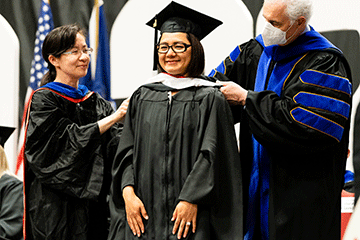 “Commencement always brings so much joy to SUNY Cortland, especially for our students and their loved ones,” university President Erik J. Bitterbaum said. “Many years of hard work and sacrifice culminate in these special ceremonies. For our graduates, Commencement serves as a celebration of achievement, a testament to their perseverance and a passage to extraordinary possibilities.” This year, the 10 most popular majors at SUNY Cortland are: early childhood and childhood education (159), exercise science (154), physical education (147), sport management (128), business economics (107), psychology (91), inclusive childhood education (88), communication studies (62), speech and hearing science (55) and criminology (52). This year’s undergraduate Commencement speakers are Ernest Logan ’73, president emeritus of the American Federation of School Administrators and recipient of this year’s SUNY honorary doctor of humane letters; Bonni Hodges, SUNY distinguished service professor and professor in the Health Department; and Steven Broyles, SUNY distinguished teaching professor and a professor in the Biological Sciences Department. Logan, who served as a vice president of the AFL-CIO, the largest federation of unions in the U.S., will present at 9:30 a.m. during the first ceremony. Logan successfully helped negotiate salary increases, health care stability and school reforms, instituting a rating system for principals based on school performance and leadership. He also was a leading advocate for New York City’s Pre-K for All program. Logan is the vice chair of the Cortland College Foundation Board of Directors. 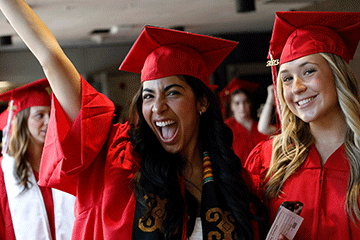 Hodges, whose far-reaching work spans local wellness programs, college athletics and international scholarship, will speak at the 2:30 p.m. ceremony. Since 2020, she has led the Institute for Division III Athlete Well-being and Athletic Leadership, which focuses on the unique needs of NCAA student-athletes. Hodges is the co-author of a book, Assessment and Planning in Health Programs, and has written peer-reviewed articles for journals including Health Promotion Practice and the Journal of School Health. Broyles, a recipient of the 2002 SUNY Chancellor’s Award for Excellence in Teaching, will speak at the 7 p.m. ceremony. Broyles has earned numerous National Science Foundation grants to fund his scholarship and assist in the development of new coursework. He also has mentored more than 40 students involved in undergraduate research. Broyles has led important local tree inventories, including the initiation of SUNY Cortland’s Tree Advisory Committee which helped earn recognition as a Tree Campus USA. Maeve Brady of Fayetteville, N.Y., who will be graduating with an M.A.T. in adolescence education: English this May, will deliver the Graduate Commencement speech. With a 4.0 grade point average, Brady has achieved equally high marks in English and educational courses. As the first student in the program to student teach as an intern, Brady is blazing the way for future cohorts of M.A.T students. During the semester, she will take over the full teaching load of her mentor on maternity leave in Moravia, N.Y. SUNY Cortland has graduated almost 88,500 students, and this year’s class will join the ranks of alumni who reside in all 50 states and Washington, D.C., three U.S. territories and 54 other countries. Daniel Walker ’06, president of the SUNY Cortland Alumni Association, will address the university’s newest alumni after each undergraduate ceremony and Jamie Piperato ’12, the association’s immediate past president, will address new alumni at Graduate Commencement. The university does not require face coverings in most public indoor spaces. Any guests who are feeling ill or have symptoms of COVID-19 are asked to stay home. Visitors may learn more about the university’s COVID-19 policies online. Details on all 2024 Commencement ceremonies, including links to live video streams of the events, are available on SUNY Cortland’s Commencement website. Cortland Challenge sets new records04/30/2024On April 17, the 2024 Cortland Challenge linked more than 3,800 alumni, faculty, staff, students and friends of the university in the spirit of giving to raise more than half a million dollars for current and future SUNY Cortland students in a single day. The university’s annual, 24-hour fundraising event this year blasted through previous giving milestones set in 2022, buoyed by overwhelming Red Dragon enthusiasm:
“This has been a thrilling year for Red Dragons everywhere to show their pride in SUNY Cortland,” President Erik J. Bitterbaum said. “The Cortland Challenge offers yet another opportunity for our community to come together and support a common goal: to open doors for our current and future students. No gift is too small to help in this effort.” “We really can’t thank everyone enough for all of the support and enthusiasm that continues to be shown for this event,” said Natasha McFadden, director of The Cortland Fund and organizer of the annual challenge. “We broke our records for donor participation and dollars raised during the Cortland Challenge this year, and our giving day has seen some of the highest participation in SUNY. “Genuinely, this could not have happened without each and every person who chose to give back to Cortland. The impact of your overwhelming generosity will be felt at our university for years to come.” The Cortland Fund supports students and campus life in a variety of ways, including scholarships, athletics, technology, major events and professional staff and faculty development. This year, donors were encouraged to target their gifts to specific university programs. Generous alumni pledged matching gifts to support the Cortland Challenge throughout the day as certain giving milestones were met. They included Norma Schlager ’62, Victor M. Rumore ’84, Anthony Moon ’86 and Susan Moon, Joel Tiss ’85, Gerald Brown, the Michael C. Holland Emergency Fund for Students, Girish Bhat and Sharon Steadman, Cheryl Barredo M ’81, and an anonymous ’03 graduate. Meet these and the other donors who helped make the campaign a fire-breathing success! This year, numerous generous alumni, faculty and staff, and friends created the opportunity to unlock more than $155,000 in matching gifts — $55,000 more than last year. On Challenge Day, a Wednesday, students, faculty, staff, alumni and friends gave to the Cortland Challenge cause of their choice at RedDragonNetwork.org/challenge. These causes included The Cortland Fund, athletic teams, campus programming and more. Donor match goals set throughout the day marked key institutional milestones, such as the increase of donor-funded scholarships that are awarded each academic year to 1,000, an exciting jump from 900 last year. The final hurdle for supporters to jump was to unlock $20,000 in matching gifts to reach 3,362 donors, one generous supporter more than the previous milestone of 3,361 donors in 2022. This will go down as the year that an outpouring of support from 3,826 loyal Red Dragons set new records on behalf of the university. 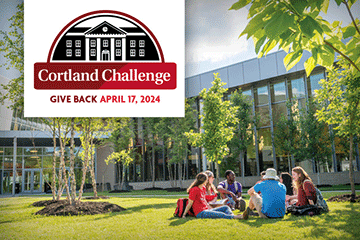 The returning Athletics Challenge garnered $248,257 in support for 20 teams broken into four categories: small, medium, large and extra-large based on the number of alumni and previous donor participation. Each team competed to earn more than $2,000 in awards by unlocking various fundraising achievements, including most donors, most dollars and highest average Cortland Fund gift. The challenge was backed by a generous, $10,000 matching gift offered by Charles Bocklet ’58. In addition, Thomas Christiano ’85 and David Colagiovanni ’11 each offered a special giving incentive to the teams they played for during their time in Cortland, men’s ice hockey and wrestling, respectively. Check out the individual team results on the Athletics Challenge website. The Department Challenge returned for a third year, only with an added $12,000 incentive donated by members of the President’s Cabinet: Erik Bitterbaum, Richard Coyne ’07, Lorraine Lopez-Janove, Ann McClellan, C. Gregory Sharer, April Thompson and Mark Yacavone ’94. This year also added a new, friendly competitive aspect among more than 40 departments seeking to raise money for their specific needs. Academic and campus areas competed for the most donors and the $2,000 first prize, plus second- and third- place prizes of $1,000 and $500, respectively. Each participating group also vied to win a $100 award if 20 unique donors contributed to their initiative during the Cortland Challenge. Meanwhile as in past years, many academic and administrative departments worked with individual gift sponsors to pledge matching gifts ranging from $500 to $10,000. Matching funds were offered by Cary Carbonaro ’90, Ernie Logan ’73, Robert Bookman ’76 Esq., Virginia Carter ’74, Michael Bond ’75, M.D., William Baerthlein ’76, M.D., Louise M. Conley, Sheri Baron ’77, Barb Galpin ’68, Marcia Anderson ’73, Frank Rossi, David Kronman ’80 and Sandra Kronman, an anonymous 2003 graduate and two anonymous 1988 graduates. In all, more than $62,000 in matching money was offered by kind Red Dragon boosters in this special challenge. Check out the individual department or area results on the Department Challenge website. Through a series of time-sensitive entreaties to meet match goals — morning rush hour, lunch hour, evening rush hour — 673 donors jumped in to give $44,763 and unlock three separate $1,000 awards. 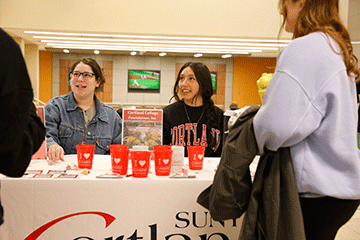 Generous supporters contributed more than $94,000 to The Cortland Fund, a discretionary fund dedicated to the university’s greatest and most immediate areas of need that have an impact on the entire campus community. This challenge was bestowed on the university by friend of the university Gerald Brown, who had pledged to match up to $5,500 in dollar-for-dollar contributions. Scroll down the Cortland Challenge homepage to find out the details. Notably, this year as part of The Cortland Fund match, nearly $9,000 was raised to benefit the Cortland College Foundation’s Student Emergency Fund administered by Student Affairs. The Michael C. Holland Emergency Fund for Students Committee created a special, one-time matching gift to benefit the university’s fund. The matching gift was made by redirecting a private fund created in memory of Michael C. Holland, a popular Student Affairs administrator who died in 2011. That fund had been run by a combination of university and Interfaith Association staff members. To see where people chose to make their gifts in the Cortland Challenge, visit the RedDragonNetwork.org/challenge site, which soon will be updated with the fundraising results. Capture the MomentMembers of the SUNY Cortland football team saw their national championship rings for the first time Sunday, April 28, during a ceremony in Park Center Alumni Arena. SUNY Cortland unseated North Central College (Ill.), the undefeated, reigning national champ, to win its first-ever Division III national title. All members of the team, coaches, trainers and student managers received rings, thanks to a generous fundraising effort led by alumni football players. Also this weekend, two of the Red Dragon gridiron champions, both wide receivers, were signed as undrafted free agents to National Football League teams! Cole Burgess is going to the Cincinnati Bengals, where Dan Pitcher ’10, M ’11 is offensive coordinator, and J.J. Laap is headed to the Los Angeles Rams. Photo by student photographer Kristen Jeppestol. In Other NewsProfessors earn Distinguished rank among SUNY colleaguesTwo SUNY Cortland faculty members were recently appointed to the SUNY system’s highest academic tribute, the rank of Distinguished faculty by the SUNY Board of Trustees. The Distinguished rank elevates full professors who excel in professionalism, scholarship, instruction and the breadth and significance of service. The honored faculty and their new titles are:
All active Distinguished faculty are part of the SUNY Distinguished Academy, which builds and supports academic excellence by leveraging their skills, expertise and talents. Ibipo Johnston-Anumonwo Johnston-Anumonwo has a Bachelor of Education in Teacher Education from the University of Ibadan, Nigeria, and a Master of Education with a concentration in international development from Harvard Graduate School of Education. She was awarded a Ph.D. from Clark University, where her dissertation study focused on “A Geographic Perspective on Occupational Segregation.” 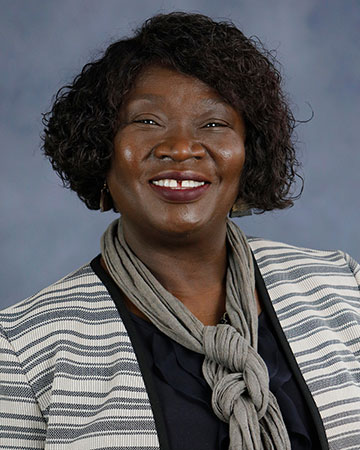 Since then, she’s become an innovative scholar in academic areas that include urban geography, feminist geography and other topics related to equity and social justice — becoming recognized for her work at the statewide, national and international levels. Her service to local groups, including the Cortland YWCA, is also of note. The organization nominated her for the 2017 Woman of Achievement Award through Zonta International. “Her impact and the respect she has earned for her work, evidenced by the numerous invitations, citations, and awards she has received, make her an outstanding nominee," one colleague wrote in support of the nomination. "Indeed, her record — broad in its scope, sustained in its length, and multifaceted in its impact — meets the criteria for which this rank was created.” For almost 20 years, Johnston-Anumonwo has served as a leader for The College Board’s AP Human Geography exam evaluation, including a position on the seven-member Test Development Committee from 2003 to 2007. In 2016, she was recognized nationally by the Association of American Geographers (AAG) with the organization’s Distinguished Teaching Honors. At the time, she was one of only seven people to receive the award. She’s also earned a fellowship as part of the Carnegie African Diaspora Fellowship Program, which recognizes exemplary projects at African higher education institutions. Through that work she was able to collaborate with faculty at African universities on sustainable urban transportation. Johnston-Anumonwo's published works includes five books of combined authorship, 17 book chapters, 16 journal articles and four book reviews. This recognized expertise has led to 26 invited presentations across the globe since 1988, bringing her to countries including Germany, Kenya, India, Argentina, Morocco, Ghana, Canada, Ecuador and Peru. In the U.S., she’s had speaking engagements at Clark University and Cornell University. She’s also been an invited “Spotlight Speaker” for the American Geographical Society. In a letter of recommendation, Lisa Benton-Short, professor of geography at George Washington University, wrote, “Not surprisingly, Dr. Johnston-Anumonwo is a highly sought-after speaker and presenter, and she has been invited to give keynotes, talks and participate in panels at universities around the U.S. and internationally, particularly at West African universities in Ghana and Nigeria.” Credited as one of the originators of analyses of gender, work, space and occupation, Johnston-Anumonwo is considered a founding scholar in her area of research. She is cited in major publications like Habitat International, Sustainability and the Journal of Health Economics. Her 1985 published paper “Gender Differences in Work-Trip Length” remains a key academic resource after almost four decades. Before her current honor, Johnston-Anumonwo had already been recognized with the SUNY Chancellor’s Award for Excellence in Scholarship and Creative Activities. She earned the New York African Studies Association’s Ali Mazrui Outstanding Publication, Book and Educational Activities Award. While at SUNY Cortland, Johnston-Anumonwo received the university’s 2005 Outstanding Achievement in Research Award. Now with this new honor, Johnston-Anumonwo's “brilliance” and “attitude of inclusivity” were cited by President Erik J. Bitterbaum as pillars of her ongoing successful career. She becomes the 11th SUNY Cortland faculty member to achieve the Distinguished Professor rank. Beth Klein Klein began teaching in the Childhood/Early Childhood Education Department at Cortland in 1999. She also serves as the university’s sustainability coordinator. In 2016, she received the SUNY Chancellor’s Award for Excellence in Faculty Service, and has earned additional awards for scholarship, teaching and civic engagement. 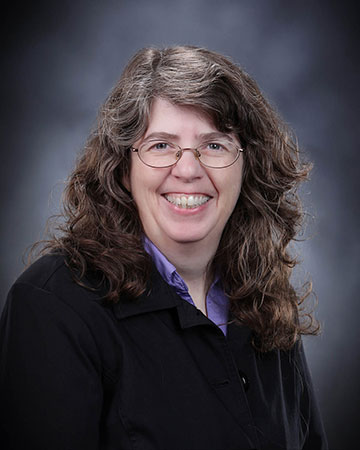 Klein has a Doctor of Education in Science Education from the University of Virginia, a Master of Science in Education in Reading from East Stroudsburg University and a Bachelor of Science in Environmental and Elementary Education from Slippery Rock University. In a letter supporting her nomination, Bitterbaum described Klein as a “champion of sustainability at all levels.” Her environmental work is a major cause of SUNY Cortland's recognition by the Association for the Advancement of Sustainability in Higher Education. Klein is listed by the Princeton Review in its “Guide to Green Colleges.” SUNY Cortland is ranked by Sierra magazine among the top 100 universities in the nation for sustainability for six consecutive years. “Over the past decade, in her role as campus sustainability coordinator, Dr. Klein has quite literally transformed how our campus engages with issues of sustainability,” wrote one nominator, Andrea Lachance, dean of SUNY Cortland’s School of Education. Klein is an active member of New York State Teacher Environmental Education Preparation program since 1999. She served the New York State Outdoor Education Association as a member of its Environmental Education Non-Formal Certification Ad Hoc Committee. This committee developed a plan to implement non-formal environmental education certification. Throughout her career, Klein has taught students, faculty and staff how to create and discuss solutions to sustainability in their lives. For more than decade, she has been an active member of the New York State Consortium for Sustainability in Higher Education. She also co-chaired the Environmental Literacy Committee from 2008 to 2009 and 2012 to 2020. In 2010, Klein received the NYSOEA Leadership Award in recognition of her innovative efforts to promote outdoor and environmental education. Bruce Mattingly, dean of SUNY Cortland’s School of Arts and Sciences, wrote that she “... purposefully found ways to apply her disciplinary knowledge and expertise to address issues that are of fundamental importance to our society and in fact, the health and well-being of our planet.” Among many campus roles Klein has taken on are faculty coordinator of the Center for Outdoor and Environmental Education; co-chair of the AASHE Sustainability Tracking and Assessment Rating System (STARS) Campus Working Group; and the SUNY Cortland Sustainability Coalition. She’s also spent four years as the graduate coordinator for the university’s graduate program in childhood education. Klein has twice served as the interim chair of the Childhood/Early Childhood Department. SUNY Distinguished Teaching Professor Steven Broyles noted that “Dr. Klein’s service at SUNY Cortland represents a continuous and career-long endeavor across the breadth of the university’s structure.” The list of committees she’s served on speaks to Klein’s dedication to the university: Campus Garden Advisory, Bee Campus USA, Sustainability Curriculum, Green Days, Climate Action Plan and additional advisory committees. She has also been a part of 21 search committees for faculty colleagues and professional staff members, the school personnel committee, her department personnel committee. For one year she chaired the university’s Long-Range Planning Committee. “At heart, Dr. Beth Klein is an educator in every sense of the word — of people, of students, of colleagues. Her passion for education and the environment threads through all of her teaching, scholarship and service,” Bitterbaum said. “She integrates her educational training and research into her service outlets, using her expertise to create memorable experiences for children, pre-service teachers and many others outside of Cortland.” She becomes the 12th SUNY Cortland faculty member to achieve the Distinguished Service Professor rank. Faculty, staff recognized by SUNY chancellorThree SUNY Cortland faculty, professional staff and classified service members will receive the prestigious State University of New York Chancellor’s Award for Excellence. The Chancellor’s Awards provide systemwide recognition for consistently superior professional achievement and encourage the pursuit of excellence at all 64 SUNY campuses. Each campus president submits nominations, which are reviewed by the SUNY Committee on Awards. The 2024 honorees are:
This year’s award winners are profiled below. Moataz Emam Emam, who earned SUNY Cortland's 21st Chancellor's Award in this category, is an internationally respected scholar in the supergravity realm of superstring theory, which seeks a theoretical explanation unifying all observed phenomena in the universe under one set of principles. Despite the complexity of this highly mathematical branch of physics, Emam has achieved an impressive publication track record and a global reputation. 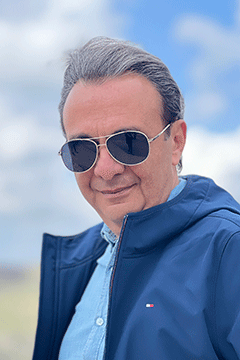 In exploring a “theory of everything” for more than two decades, Emam’s sustained scholarship has resulted in 18 peer-reviewed articles, most of them in world-respected journals such as the American Journal of Physics, Classical and Quantum Gravity and Physical Review D. He is credited by colleagues for finding solutions to challenging problems and “going viral in the field” for prompting discussion among string theorists and physicists in general. His publication record includes two books, including a 2021 textbook published by Oxford University Press titled Covariant Physics: from Classical Mechanics to General Relativity and Beyond. He called this work the highlight of his scholarly career so far, one that grew out of a deep interest in teaching advanced research topics to students. Emam’s engagement with a global audience is equally impressive. A native of Egypt, he has offered more than 40 scholarly presentations at regional, national and international levels, from Mount Holyoke College and the University of Massachusetts at Amherst to many universities in Egypt. Emam’s outreach embraces technology to promote diversity in the scientific community. His YouTube channel, blog and professional social media accounts inspire thousands of Arabic-speaking scientists. He also is a frequent voice for interviews on complex concepts related to physics. Emam earned a B.S. in civil engineering, a B.S. in physics and an M.S. in physics at Cairo University in Egypt. He holds a Ph.D. in physics from the University of Massachusetts Amherst. He taught as a visiting faculty member at Mount Holyoke College, Smith College, the University of Massachusetts Amherst and Clark University before joining SUNY Cortland in 2008 as an assistant professor of physics. Dan Harms Harms, SUNY Cortland's seventh librarian to earn this honor, makes extraordinary contributions through his skills demonstrated in Memorial Library, to the librarian profession across SUNY, to his unique scholarship, and his tireless service as a union advocate. Harms joined the SUNY Cortland faculty in 2005 and currently holds the rank of associate librarian. As an instructional services librarian, he is a key resource for campus community members on topics such as information literacy, online database work and primary source research. He is a trusted liaison to academic departments including Economics, English, Psychology and Sociology/Anthropology, and his efforts often prove interesting and innovative. For instance, a vampire game he created with a colleague to teach students about evaluating sources spurred a conference presentation and was adopted by three other SUNY libraries. This example speaks to his creativity, a diverse skillset and the example he sets for colleagues. 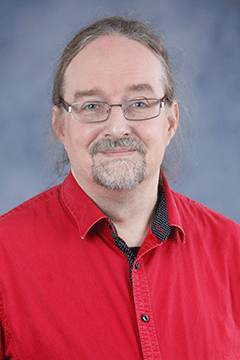 With regards to his continued scholarship, Harms has authored or co-authored more than 70 publications spanning books, journal articles and book reviews. He has delivered 20 conference presentations on various topics, from library-related research to fascinating academic interests such as magic studies and the occult. This impressive research is matched by his tireless service, with which his name is synonymous at SUNY Cortland. Harms has made immense contributions to United University Professions, at both the campus and statewide levels, as well as SUNY Cortland Faculty Senate and at least 20 campus committees. A past president of the SUNY Librarians Association, Harms has earned lifetime membership as well as a prestigious 2023 Friend of the SUNYLA Award. Harms earned a B.A. in anthropology and English from Vanderbilt University; an M.A. in anthropology from the University at Buffalo; and a Master of Library and Information Science from the University of Pittsburgh. Barbara Drake An administrative assistant 1 in the Biological Sciences Department since 2019, Drake has earned a reputation as the department’s “backbone.” Whether it is a question related to academic advising or classroom technology or a campus process, her colleagues report that Drake always is a wonderful resource for students, faculty and staff alike. Her knowledge and preparation often have a ripple effect. She is a trusted mentor to other administrative assistants in the sciences and continuously uses her intuition to help the world around her, from classroom wayfinding for new students to curriculum improvements based on student feedback. “Barbara Drake is a shining example of the commitment and exceptional customer service on our campus,” said SUNY Cortland President Erik J. Bitterbaum. Drake joined SUNY Cortland in 2016, following a nearly four-decade career at the Cortland Regional Medical Center. She currently helps to manage more than 150 courses listed under five academic major prefixes — one of the largest course scheduling responsibilities on Cortland’s campus — in addition to faculty meetings and room availability in Bowers Hall, the university’s home to the sciences. “Barbara’s greatest contributions come in her willingness to go beyond her job description,” said nominator Professor Steven Broyles, a past department chair and SUNY distinguished teaching professor. Drake always is quick to volunteer at any SUNY Cortland event celebrating the achievement of the department’s students, from Honors Convocation to Commencement. “She is the type of person who arrives to work 30 minutes early and often leaves late because she is helping others,” Broyles wrote. “She is a well-known and friendly face to the department’s 300-plus majors, always providing various small treats, stress relievers and notes of encouragement, especially during exam weeks.” She is the university's 16th honoree for classified service. SUNY Chancellor spends Earth Day at SUNY CortlandSUNY Chancellor John B. King spent much of Earth Day on the SUNY Cortland campus, where he helped plant a tree, chatted with student leaders, attended a Passover Seder and touted Cortland as a university leader in sustainability. “When people get depressed about the existential threat of climate change, I think we have to remember that we have the capability to respond, and one of the reasons that I wanted to be at Cortland on Earth Day is because Cortland has responded,” King said. The chancellor, head of the largest comprehensive public education system in the United States, joined President Erik J. Bitterbaum and dozens of students, faculty and staff Monday, April 22, for a ceremonial tree planting in front of Sperry Center. Senior biology major Deymiss Caraballo-Bobea shared a brief history of Earth Day and what it means for the SUNY Cortland community before a trio of students lowered the sapling into a hole and King and Bitterbaum tossed in the first shovelfuls of dirt. “To celebrate Earth Day 2024 we will plant a Sargent Crabapple tree,” Caraballo-Bobea said to the gathering. “Its beautiful, fragrant white flowers will bloom every Earth Day to remind us on the SUNY Cortland campus of our belonging to the earth.” After the ceremony, King addressed academic department chairs and administrative leaders during Cortland’s bi-annual administrative conference, where he discussed the progress that’s been made fighting threats to the environment, and lauded SUNY Cortland’s “green” achievements. He noted:
“I think it’s a great example for our system,” King said. “The work your dining hall has done to reduce waste is a model for the rest of the SUNY system. He said the goal of the sprawling SUNY system was for all 64 campuses to become carbon neutral, which was going to require the kind of investments and policy changes that Cortland continues to make and other campuses are adopting. King noted the creation of SUNY first chief sustainability officer position last year. Carter Srickland, the man King named to the post, visited SUNY Cortland earlier this month to tour campus and talk with students, faculty and staff about Cortland’s efforts to reduce its carbon footprint. “I am very appreciative of how Cortland has led the way, and now the system is following suit,” King said. “On this Earth Day, let’s look back on the progress we have made and look ahead to the progress that we will make.” Following the conference, the chancellor met with Student Government Association leaders who updated him on The Big Event, a student-organized annual community cleanup. This year, it was held on Sunday, April 21, the day before Earth Day, drawing 450 student volunteers to 50 work sites in the city of Cortland. Later that evening, he joined Bitterbaum at a community Seder hosted by students from SUNY Cortland Hillel in Corey Student Union. Rocking it: geology alum has meteoric successWhen most kids his age still wanted to be high-flying superheroes, Cooper Malanoski ’19 already knew his true calling was more grounded, focused on the fossils and rocks he avidly collected. That lifelong love of geology has now let the Oxford University Ph.D. student direct research that could predict which animals are most threatened with extinction by global climate change. The 26-year-old alum Malanoski is the lead author of “Climate change is an important predictor of extinction on macroevolutionary timescales,” a paper published this March in the highly respected academic journal Science. “Reconstructing climate over 485 million years is no easy task, so I anticipated that this is something that I could attempt later on in my career,” Malanoski said. “Thankfully, my advisor introduced me to researchers that were interested in working together to bring my idea to fruition.” During the project he was the lead author and researcher in the group responsible for running data analysis. As a team, they needed combined expertise in climate modelling, paleontology, geology, programming and statistics. “Cooper’s achievement of publishing a paper in the prestigious journal Science as a doctoral student serving as the first author is truly remarkable,” said Li Jin, professor in SUNY Cortland’s Geology Department and coordinator of the Environmental Science Program. Jin added that in his time at Cortland, Malanoski maintained a 4.03 GPA while staying active in research projects with Distinguished Professor Christopher McRoberts and Distinguished Teaching Professor Robert Darling of the Geology Department. 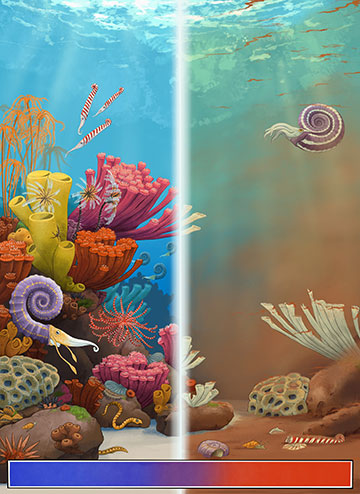 That broad experience in and out of the classroom at Cortland can give students an extra boost toward successful careers in geology and environmental geoscience, Jin said. The history of Earth and its life has always been interesting to Malanoski. When he was 4, Malanoski's mother took him with her to a geology course at Mohawk Valley Community College in Utica, N.Y. “The professor and students showed me the rocks, minerals and fossils and taught me about geology, and my passion for geology grew from that point onwards,” he said. “I then began hunting for fossils and collecting minerals for most of my life. So, I always knew that I wanted to pursue a career in geology — and had Cortland in mind as one of the top universities to pursue my goals.” Malanoski began at SUNY Cortland in 2016, graduating in three years before going to Baylor University in Waco, Texas. “Cortland prepared me very well for this transition to Baylor,” Malanoski said. “The excellent geology courses and research experience that I had at Cortland allowed me to hit the ground running at Baylor, and I was able to get a 4.0 and do some exciting research.” After Baylor, Malanoski earned a Clarendon Fellowship — given to distinguished grad students — at Oxford. Although he is earning a Ph.D. at one of the most prestigious universities in the world, he credits the education he gained while in Central New York. “Ultimately, a big reason for my success so far has been a result of the excellent foundational knowledge that I gained while studying at Cortland, and I truly believe that the undergraduate program at Cortland is comparable, and of a similar standard, to Baylor and Oxford.” Malanoski said he was surprised he had the chance to pursue such a large project within the three-year constraint of his Ph.D. studies at Oxford; especially since it began as a research proposal Malanoski detailed in his application to Oxford. Research for the paper used fossils and geologic data on climate change over hundreds of millions of years to gain insight on how climate changes lead to mass extinctions and predict what species are most at risk in today’s warming world. The chance to use the geologic past to inform the present is not only fascinating, but practical, he noted. Old fossils can aid current understanding of long-term natural processes like extinction and give insight into reducing the effects of climate change. “It has been great to have the experience creating and organizing such a large-scale project,” Malanoski said. “Collaboration is such a pivotal part of science, so it is invaluable to have the opportunity to build my collaborative network early on in my career.” Now, Malanoski is excited about what may come next. After a final year at Oxford, he will apply for post-doctoral positions in the United Kingdom, Germany, China and California. He hopes to eventually become a professor himself and inspire the same love of geology in students that’s captivated him his whole life. “Ultimately, I wish to pursue a career in academia, and hope that I could one day teach at a university in New York like Cortland,” Malanoski said. “I really enjoy teaching and outreach, so I think being a professor at a primarily undergraduate university like Cortland would provide a great opportunity to inspire students to pursue a degree in geology.” Cortland students help preserve American historyOn April 27, 31 SUNY Cortland history students had a unique opportunity to help the National Park Service preserve the history of an American emancipation icon. Students in Associate History Professor Evan Faulkenbury’s intro to public history course collaborated with the park service and residents of Auburn, N.Y., to host a “History Harvest” to collect artifacts for the newly created Harriet Tubman National Historic Park, set to open in Auburn later this year. “We try to help students understand that history isn’t just something you read about in a book,” Faulkenbury said. “Every year, I try to have some project where the students make history in the world.” For this year’s project, the students asked the city’s residents to dig through dresser drawers, scavenge attics and search their closets for memorabilia and items relating to the Thompson Memorial AME Zion Church and its surrounding neighborhood. Memorial AME Zion was Tubman’s church, and the congregation — like Tubman — was involved in the Underground Railroad. The church and its parish house were purchased by the park service in 2017. The property is undergoing extensive restoration in preparation for its opening later this year. 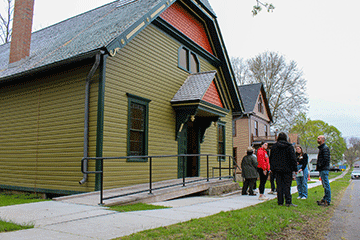 Unlike museums that receive donated physical artifacts, the Tubman site’s “History Harvest” allowed family heirlooms and personal histories to be shared and recorded without being lost to those who own them. Submitted items — such as letters, old photographs, church bulletins, memorabilia, etc. — will be scanned or photographed. The originals will be returned to the owners, and the digital copies will be displayed in future museum exhibits at Tubman National Historic Park. “You don’t get to do this very often,” said Juliana Sparachino, a sophomore dual major in adolescence education and history from New Springville, N.Y. “It’s interesting to see how involved our History Department has been when trying to get students involved with real-life history. You don’t see this happening very often with other colleges.” Faulkenbury, a SUNY Cortland faculty member since 2016, previously has assigned students in this course to work on projects with the local 1890 House Museum, the Cortland County Historical Society and the university’s archives and special collections housed in Memorial Library. The creation of the Harriet Tubman National Historic Park about 35 miles northwest of Cortland, presented an irresistible challenge. In 1891, the Thompson Memorial AME Zion Church was built thanks to an impressive fundraising effort among the Auburn community. Tubman herself donated $500. 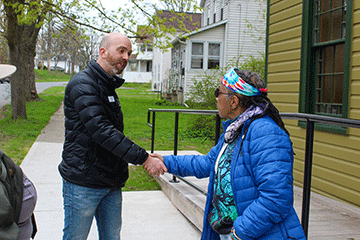 The congregation of Thompson Memorial used the building for more than a century, leaving the aging facility in 1993 for a newer and more suitable location. Notably, several members of the congregation had worked as Underground Railroad activists. The site now serves as a reminder that churches nationwide were important locations for freedom seekers, often represented as “stations” on the Underground Railroad. In 1974, the National Register for Historic Landmarks listed the Thompson Memorial A.M.E. Zion Church. Since the National Park Service acquired the vacant building seven years ago, it has worked to restore it. When the park opens, the church will appear as it did in 1913 for Tubman’s funeral. Faulkenbury divided his students into six groups, each with six different tasks leading up to April 27. Sparachino’s group, for example, acquired food and beverages from the community for the event. In their extra time, this group helped spruce up the outside of the church. Another group was tasked with press, social media and marketing for the event. A third group worked with SUNY Cortland Archivist and Instructional Services Librarian Brian Jirout to acquire the needed scanning technology and serve as documentarians of their project for the NPS. “This project has helped shift my view of history from a broader perspective to a narrower one, focusing on the smaller towns in which history was made,” said Rachel Bouwens, a sophomore dual major in history and adolescence education: social studies and history from Homer, N.Y. 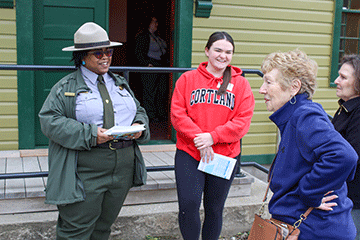 “I hope to be able to, ideally, hear stories about Harriet Tubman’s actions and legacies in the community or stories about the church,” she said. In 1849, Tubman escaped her plantation in Maryland to Philadelphia with the help of the Underground Railroad, a system of secret routes and safe houses that guided slaves to the North. She would make over a dozen trips back into slave states as a "conductor” of the railroad, leading approximately 70 slaves to freedom and teaching countless others how to escape independently. An icon of freedom, Tubman is set to replace former president, Andrew Jackson on the $20 bill in 2030. Beyond the noble experience of interacting with American history, the course represented a steppingstone to their futures. “We’re trying to show that it’s a very versatile degree,” Faulkenbury said. “You can work in public history, in the museum world, at a historic site, or at a non-profit, so it’s just a matter of helping the students think about how they can better sell themselves.” Even for those who want to teach, like Bouwens, the course and experiences like this impact their views on history and how they’ll teach it. “I think that this project and the class as a whole will help me as a teacher a lot,” Bouwens said. “The entire point of this class is to discuss how historians can make history interesting for people who don’t like history. This project helps to bring in the local public history aspect, which can help students connect more abstract historical concepts to something they could be familiar with.” To see more about the project or find out more information, contact the class through Instagram. Prepared by communications office writing intern Jean-Andre Sassine '23 Student Select 2024 lists winnersStudent Select 2024, an annual, juried exhibition featuring artwork created by 50 SUNY Cortland art students, opened on Monday and runs through Friday, May 3, in the Dowd Fine Arts Center’s Dowd Gallery. The exhibition is free and open to the public. Carla Stetson, a contemporary artist and educator in the Ithaca, N.Y., region, was invited to be this year’s juror by the student-run Art Exhibition Association, which organized and sponsored the exhibition. 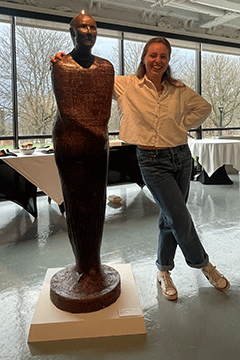 “I selected pieces that I believe will make a strong student exhibition showcasing works from all media areas,” Stetson said. Winners were announced for best in show, second prize, third prize and honorable mentions on April 17 during an opening reception and awards ceremony in the Dowd Gallery. The ceremony featured the student artists, faculty and staff from the Art and Art History Department and Stetson. 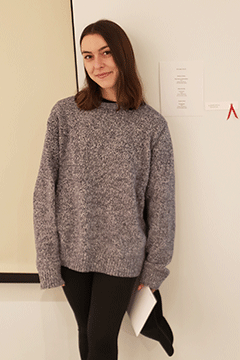 Stetson, whose work was displayed in the recent “Eye Witness” exhibition, made her final selection of work on April 9. She chose for the exhibition 76 pieces made by 50 student artists out of 97 submissions. Their names are listed at the end of the article. “This year’s exhibition explores the depths of the Art and Art History Department’s studio course diversity with a range of work from foundational courses through specializations,” Stetson said. “Visitors will experience a varied display of drawing, sculpture, ceramics, digital, print media, fibers, painting and more. “Besides the first, second and third place winners, I selected three worthy honorable mentions. These award-winning works stood out for many reasons, most importantly a brave and innovative use of materials combined with an original, often very personal, conceptual basis. They were poignant, sometimes humorous and each winning entry demonstrated exceptional technical skill.” After careful deliberation, Stetson selected three students as winners of the Student Select 2024 exhibition. Three Honorable Mentions also were awarded. First Prize went to Chloe Loewenguth for the 2024 wax and cotton wick piece titled “Neglecting Myself.” 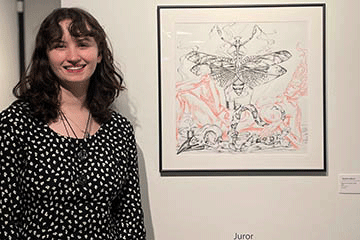 Virginia Alvisi was awarded Second Prize for the 2024 digital animation piece titled “Overthinker.” Sophie Marin took Third Prize for “Ritual of the Flower Moon,” a 2023 pen and ink piece. For Honorable Mention, three students were recognized:
Additionally at the opening reception, Dana Garrison, a graduating BFA studio art major with a concentration in painting, delivered her BFA thesis defense on her body of work, “In the Weeds.” Garrison also was introduced as this year's winner of the Muriel and Newell Keegan Prize for Excellence in Art, established in 2020 by alum Kevin N. Keegan ’76 and his wife, Linda DeRuvo-Keegan to honor Kevin’s parents. The award, formally announced at this year’s Honors Convocation on April 20, is given to the most outstanding senior student enrolled in any Art and Art History Department major. 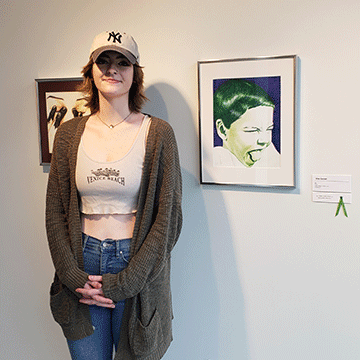 Garrison’s BFA exhibition “In the Weeds” is on display in the west wing of the Dowd Gallery. Scott Oldfield, gallery interim director, described “In the Weeds” as a journey through the artist’s relationship with herself and the individuals surrounding her. “Each piece provides a window into the intricate tapestry of emotions, experiences and connections that have shaped her existence,” Oldfield noted. “Through a dynamic use of color, form and symbolism, the artist delves into the complexities of human interaction, exploring themes of love, loss and resilience,” Oldfield said. “In our lives, we can find comfort in comparison,” Garrison said of her mainly mixed media work, which allows her to create layers that push and pull each other, symbolizing fluctuations in the human condition. “A bad day can be compared to a bump in the road which wears itself out over time. A first touch with someone we come to love can be fireworks. Comparison helps us make sense of feelings that may be hard for us to experience: a juxtaposition of our emotions and experience to the known and accepted. Growing up surrounded by nature, from my grandfather’s garden to the dense forest behind my childhood home, I use symbols of nature as proxies for my personal experiences and emotions.” 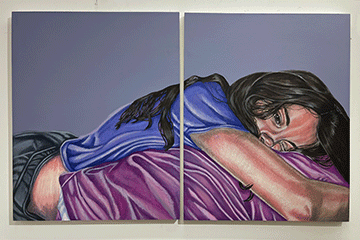 During finals week, the gallery will remain open with a pared-down exhibition as students remove their work and faculty picks are relocated for display at Memorial Library. The gallery in Dowd Center is located on the corner of Graham Avenue and Prospect Terrace. The Dowd Gallery is open from 10 a.m. to 5:30 p.m. Mondays, Tuesdays, Wednesdays and Fridays; and 10 a.m. to 7 p.m. on Thursdays. Walk-ins are welcome. The exhibition is closed on Saturdays. For more information, an appointment, a tour, or additional images, contact Oldfield at 607-753-4216. Visit the SUNY Cortland Dowd Gallerywebsite for details about exhibiting artists, other programs, safety protocols and group visits. Participants in this year’s Student Select also include: Jade VanZile Angie Tillapaugh Madison Hanford Allison Perna Danielle Lewis Gabz Danyew Devon Blackwood Lee Clasby Zoe Vaughn Dina Palaguachi 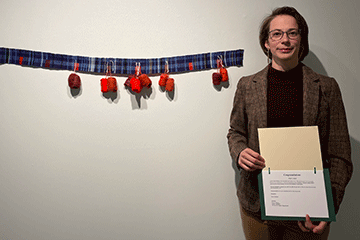 Abigail Benham Kathleen McDonough Brooke Missina Aimee Craddock Lisa Smith Terrell Parks Ashley Nazario Morgan Cherrone 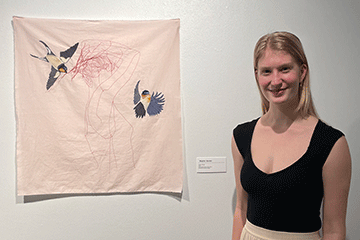 Jordan Hildalgo Rameen Zehra Cameron Eastwood Sarah Goldberg Kat McCormick Marjorie Castilla Jean Tomassini Shelby Swift Henna Luke Keightlen Eaton Ashley Hoyte Bob Ponterio Miles McCabe Brooke O’leary Ray Beltran Marissa Deluca Firat Ercan Terrel Parks Christopher Ramirez Ariele Vance Nick Kaires William Henry Hilburger X’Avion Irons Haley Lambert Yves Auguste Four earn SUNY Scholar Athlete of the Year awardsSUNY Cortland junior Leah Bernhardt (Groton), sophomore Isaiah Brunache (Bennington, VT/Mount Anthony Union), junior Gabrielle Nadler (Potomac, MD/Richard Montgomery) and senior Logan Streety (Elma/Iroquois) have been honored as 2023-24 State University of New York (SUNY) Scholar Athletes of the Year during the winter season.
Bernhardt is the SUNY system's Division III honoree for women's swimming and diving. Brunache is the winner for men's indoor track and field. Nadler was recognized in the Division III winter at-large category. Streety was honored for women's basketball.
Bernhardt is a graphic design & digital media major who entered the spring semester with a 3.92 overall grade point average. This past March she won the State University of New York Athletic Conference (SUNYAC) title in the 500-yard freestyle and was the SUNYAC runner-up in the 200-yard freestyle. She also placed third in the 1,650-yard freestyle, and during that race set a school record in the 1,000-yard freestyle with her opening 1,000-yard time of 10:37.22.
Brunache is an exercise science major who brought a 3.99 overall GPA into the spring semester. He was an NCAA qualifier in both the weight throw and shot put this winter, but did not compete at nationals due to injury. He earned All-Niagara Region honors in both events and won the weight throw and was runner-up in the shot put at the SUNYAC Championships. Brunache set a school record in the weight throw (18.51 meters/60' 8.75") at the AARTFC Championships.
Nadler is a sports studies major with a 3.92 overall GPA entering the spring semester. She earned all-region honors at the National Collegiate Gymnastics Association (NCGA) East Championships with a tie for sixth place on floor exercise, posting a career-high 9.80. She tied for 27th place on floor at NCGA national championships with a 9.70.
Streety is an exercise science major who entered the spring semester with a 3.87 cumulative GPA. She earned second team D3hoops.com all-region and first team All-SUNYAC honors after averaging 14.8 points and 8.7 rebounds per game in 26 contests.
The Winter SUNY Scholar Athlete Awards recognized 21 student athletes from SUNY colleges and universities sponsoring intercollegiate athletics at the four-year and two-year levels who were nominated and voted upon by representatives of their respective institutions. Nominating information includes cumulative grade point average, current and career statistics, and athletic and academic honors.
More than 14,000 student-athletes compete at SUNY institutions representing 53 different colleges and universities at the NCAA Division I, NCAA Division III/USCAA and NJCAA levels and are eligible for the awards. The 19 Division III institutions in the SUNY system are: Alfred State, Brockport, Buffalo State, Canton, Cobleskill, Cortland, Delhi, Farmingdale, Fredonia, Geneseo, Maritime, Morrisville, New Paltz, Old Westbury, Oneonta, Oswego, Plattsburgh, Potsdam and SUNY Poly. SUNY-ESF, the lone four-year SUNY institution sponsoring intercollegiate athletics that is a member of the United States Collegiate Athletic Association (USCAA) instead of the NCAA, participates in the program with the 19 NCAA Division III members for a total of 20 colleges and universities.
The SUNY Scholar Athlete Awards, which originated in the fall of 2022, recognize outstanding academic and athletic success in 29 different sports and are presented three times a year to coincide with the specific sports contested in the fall, winter and spring seasons. The Scholar Athletes of the Year in each sport will then be nominated for an overall Scholar Athlete of the Year for men's sports and women's sports in each category that will be announced in mid-July.
Because sport sponsorship varies among institutions, a minimum sponsorship formula has been developed for award selections. At least three (3) institutions must sponsor the sport in the Division I category, while at least five (5) institutions must sponsor the sport in the SUNY Division III/USCAA and SUNY NJCAA categories. For sports that do not meet the minimum threshold to be a viable award, an At-Large Category has been developed for each level and each season.
University recognizes student leadersSUNY Cortland honored 49 students who played integral leadership roles on campus. One student organization, one faculty member and one staff member were also recognized for their contributions. The following were recognized at the 39th annual Student Leadership Recognition Banquet on Thursday, April 18: Outstanding Student Leaders Rebecca Andujar Maurice Anokwuru Vincent Aquino Parker Arenas Lauren Bentz Lauren Bonura Michael Catoggio Angel Chauca Rosendo Zoe Climenhaga Claire Cornell Taylor DeCastro Devin Diaz Khyla Diggs Jade Entien James Escolastico Chase Fusaro Jahlil Granum Caitlin Hulbert Maya Iwanejko Grace Jarvis Britney Jurado Patrick Kiernan Madison Lauber Abigail Loiselle Emily Martinez Hunter Martorella Joseph Mascetta Samantha McKay Riley Meckley Taylor Mitzkavetch Crystal Nunez James Paterson Matthew Pestle Damon Postance Ubense Rivera Holden Sarosy Emma Secor Meghan Shepanski Emily Sommer Logan Streety Emily Thomas Skyler Turpin Emily Vayda Sophia Waters Aaren Woodworth Haley Yegidis
Leadership in Diversity, Equity and Inclusion Khyla Diggs James Escolastico
Leadership in LGBTQAIP Advocacy Vincent Aquino Jade Entien
Excellence in Leadership Michael Catoggio James Escolastico Madison Lauber Hunter Martorella Crystal Nunez
Outstanding Senior Joseph Mascetta
Student Government Association Awards Outstanding Club Member – Jordan Pachecho, Sport Management Outstanding SGA Involvement – Emily Sommer Outstanding Club – Best Buddies Outstanding Staff Member – Mary Kate Morris Steven J. Barnes Outstanding Faculty Member – Jeffrey Radloff Michael C. Holland Memorial Scholarship: Khyla Diggs, Dwayne Jones and Riley Meckley
Vice President for Student Affairs Merit Scholarship Kate Jensen
The student awardees were invited to share the name of a person who has been supportive of them. Thank you to the dedicated faculty/staff listed below. Danielle Bouchard-Bihr Phil Buckenmeyer Anne Burns Thomas Kyle Cannon Jena Curtis Peter Ducey Allison Hall Alyssa Jenkins Nancy Kane Nikolay Karkov Eve Mascoli Mary Kate Morris Krista Natale Jonah Reardon Helene Schmid Marinda Souva Tricia Wilder Nance Wilson Kharmen Wingard Jacob Wright Students inducted into psychology honoraryFourteen students were inducted into Psi Chi, the international honor society in psychology, on April 17. The initiates for this year are Cassandra Bayles, Malana Booker, Daniel Cassera, Caroline Coronel, Chloe Fire, Jordan King, Sasha Machmuller, Emily Major, Anna Mezzatesta, Gabrielle Nadler, Ava Roper, Madison Shaw, Gabriela Solis and Judy Stoddard. Alexandra Vizgaitis, assistant professor of psychology, is the faculty advisor to the local chapter.  Suggest a feature story Suggest a feature story
Faculty/Staff ActivitiesPaul ArrasPaul Arras, Communication and Media Studies Department, presented a paper titled “The Presence and Absence of Bodies in 9/11 Imagery” at the Popular Culture Association National Conference held March 27-30 in Chicago. Alexandru BalasAlexandru Balas, International Studies Program and Clark Center for Global Engagement, gave the keynote address titled “Reflections on Twenty Years in Conflict Resolution” at the fourth edition of the Crisis Communication and Conflict Resolution Conference held April 17-18 in Cluj-Napoca, Romania. Approximately 50 scholars from 20 universities in the United States, Turkey, Israel, Bosnia and Herzegovina, South Africa, France, Poland, China and Romania presented at the conference. Brian BarrettBrian Barrett, Foundations and Social Advocacy Department, had his chapter, co-authored with Jim Hordern from the University of Bath, UK, published in Towards powerful educational knowledge: Perspectives from educational foundations, curriculum theory and Didaktik (Routledge, 2024). The chapter’s title is “Rethinking the foundations: Towards powerful professional knowledge in teacher education in the USA and England.” Katie DucettKatie Ducett, Foundations and Social Advocacy Department, received the Outstanding Dissertation Award from the Special and Inclusive Education Research SIG at the American Educational Research Association (AERA) annual conference held in early April in Philadelphia. Her dissertation was titled “Social Lives at College: Experiences of Students with Intellectual and Developmental Disability.” Along with this award, Ducett also presented four other collaborative research projects and chaired two sessions while at AERA.  Submit your faculty/staff activity Submit your faculty/staff activity
|
The Bulletin is produced by the Communications Office at SUNY Cortland and is published every other Tuesday during the academic year. Read more about The Bulletin. To submit items, email your information to [email protected]
© 2026 SUNY Cortland. all rights reserved.